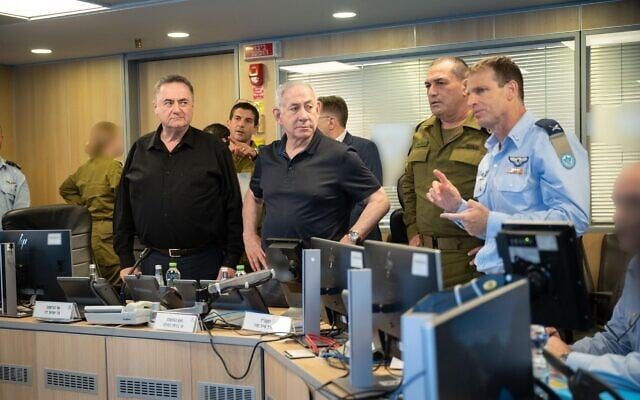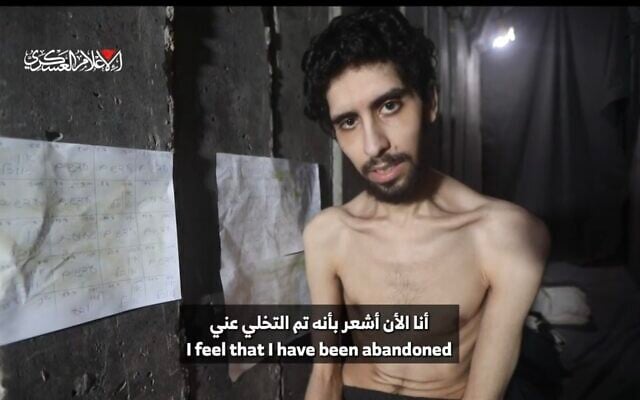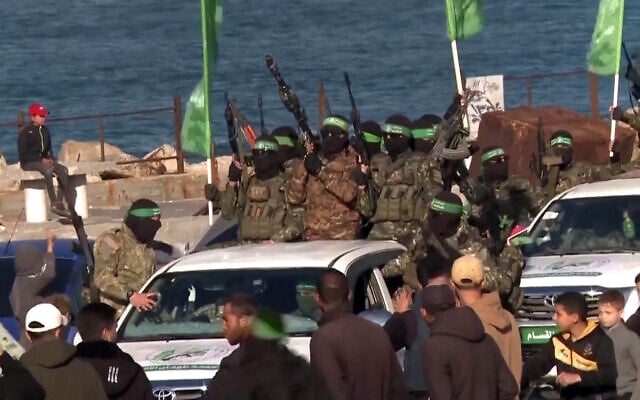This Editor’s Note was sent out earlier Wednesday in ToI’s weekly update email to members of the Times of Israel Community. To receive these Editor’s Notes as they’re released, join the ToI Community here.
Israel’s key decision-making security cabinet is on Thursday expected to approve the full occupation of Gaza, as the government seeks to achieve its prime declared war goals of destroying Hamas and securing the release of the 50 remaining hostages.
It is not at all clear what Benjamin Netanyahu’s government means by “full occupation,” however. The Hebrew terminology, employing the word kibbush, allows for multiple interpretations — ranging from short-term military control of the entire Strip, some 75% of which is currently held by the IDF, to long-term Israeli military rule and potential revived Jewish settlement.
Netanyahu has also adopted, as a formal war goal, US President Donald Trump’s February plan for the relocation of Gazans to undefined places elsewhere; it is not clear whether or how this will be pursued in the context of “full occupation.”
It is not even definitively clear that whatever is announced is what will actually play out. The recently completed Gideon’s Chariots military operation proved less intensive than described ahead of time. And the ambiguous description of imminent full kibbush, a term with West Bank echoes, could conceivably be intended as a pressure tactic on Hamas.
What is clear is that the IDF chief of staff, Eyal Zamir, the military veteran delightedly chosen by Netanyahu to succeed Herzi Halevi — who was head of the army during the October 7, 2023, Hamas assault — has grave concerns about the move: Multiple leaks in recent days have indicated that, on the conclusion of the Gideon’s Chariots operation, Zamir expected the army to be ordered to deploy around major population centers in those areas that the IDF does not fully control, and from there to launch ongoing raids — gradually limiting Hamas’s room for maneuver, reducing the risk to the hostages, and just possibly enabling a revived hostage-ceasefire deal.

Zamir is said to fear that the envisaged expansion of the war, in theory taking the IDF everywhere in Gaza, including into areas where hostages are being held, places their lives in acute danger. A year after six hostages were murdered by their captors when the IDF unwittingly neared the tunnel where they were being held, Zamir worries that similar tragedies will unfold.
As things stand, the terrible videos put out by Gaza’s terror groups in the last few days, showing the emaciated condition of Evyatar David and Rom Braslovsky, leave no doubt that the hostages are being starved to the brink of death. “I am watching my son dying before my very eyes,” Braslovsky’s father said desperately, helplessly, bitterly, in a TV interview after a clip was shown, “and there’s nothing I can do about it.”

Zamir is also said to be concerned at the escalated strain “full occupation” will place on the overextended IDF, which has been fighting for 670 days with an understaffed standing army and an exhausted reservist complement. And Gaza — the border that least worried Halevi until October 7 upended the unfathomable complacency of Israel’s political and military leaderships — is by no means the IDF’s only active front, with daily challenges in the West Bank, further to the east, across the northern border and beyond.
As Netanyahu and his government have demonstrated repeatedly since taking office, all who question its record, its policies, its plans and its decisions are instantly classified as politically motivated opponents. Yoav Gallant, the Likud’s own defense minister, who warned against the consequences of a drastic judicial overhaul way back in March 2023 and critiqued the handling of the war after October 7, is ancient history. Ronen Bar, the Shin Bet chief, who sought to delay his departure until the Qatargate investigation into aides at the Prime Minister’s Office could be completed and dared demand a state commission of inquiry into October 7, was forced out.
Foreign Affairs and Defense Committee chairman Yuli Edelstein, attempting to raise the number of Haredi recruits to the IDF in defiance of the prime minister’s will, lost his job on Monday. Attorney General Gali Baharav-Miara, who infuriatingly reminds the government that it is legally obligated to draft eligible Haredi males, and who heads the state prosecution that is trying Netanyahu in three graft cases, was fired the same afternoon, though that decision was immediately suspended by those other irritating and constantly targeted “political” opponents, Israel’s justices.

Barely five months after he was sworn in, and six weeks since the stunning achievements of the war against the Iranian regime’s nuclear and ballistic missile assets, Zamir has now also been designated a political opponent of the prime minister and his coalition. “Sources in the Prime Minister’s Office” have suggested that if he objects to the directives of the IDF’s political masters, Zamir is welcome to resign. And Netanyahu’s son Yair has implied that the chief of staff, in setting out his qualms about a full Gaza occupation, is attempting a military coup characteristic of the “banana republics of Central America in the 1970s.”
Netanyahu’s motives in expanding the war are, as ever, suspect, given that he risks losing his already weakened coalition altogether if he brings the fighting to a halt. The “far-right” component of his government — Itamar Ben Gvir’s Otzma Yehudit, Bezalel Smotrich’s Religious Zionism, and a goodly part of his own Likud — seeks not merely full occupation in the sense of Israeli military control of Gaza, but the reversal of Israel’s unilateral disengagement precisely 20 years ago, with the reestablishment and widening of Jewish settlement in the Strip, and formal annexation. (Ben Gvir, meanwhile, continues his pyromaniacal efforts to stoke war with the Muslim world by openly defying the status quo governing ultra-sensitive relations on the Temple Mount.)
Extraordinarily, however, the other core component of Netanyahu’s bloc, the two ultra-Orthodox parties Shas and United Torah Judaism, are adamantly opposed to providing the IDF with the manpower it desperately needs in a widening war. So they have to be appeased, too.

And thus, this week, we watched footage of Shas leader Aryeh Deri telling yeshiva students, even as the IDF has been sending out draft orders to tens of thousands of eligible ultra-Orthodox males, that on no account should they so much as think about enlisting. “God forbid,” he said, recoiling in horror at the notion. Yes, the people of Israel are in the midst of war, Deri allowed. But, he assured the rapt audience, “Gentlemen, the people carrying the burden are the Torah students.”
The United Torah Judaism party, formally at least, has bolted the coalition until a law enshrining broad ultra-Orthodox exemption from military service is advanced. And so Netanyahu this week resorted to firing Edelstein for failing to push through a Haredi draft-evasion law, and installed a replacement whom he expects to be more compliant.
Deri’s Shas has not yet gone quite as far as UTJ: Its ministers have resigned, but Shas has not left the coalition. And thus Deri, a non-minister who tells his voters on no account to serve in the IDF and who extorts the government to legislate their mass exemption, will be a participant in the Thursday security cabinet meeting that is set to order those who do serve into a widened and intensified phase of the Gaza war.
Amid the uncertainty over precisely what it is that the government is about to tell the IDF to do in Gaza, the key question, of course, is whether it is going to benefit Israel and effectively pressure Hamas — to expedite Hamas’s demise, to increase the prospects of getting out hostages. Cutting off aid for 11 weeks between March and May, also in an effort to ramp up pressure on Hamas, had the opposite effect — not harming the well-fed terrorists, but impacting other Gazans, enabling the anti-Israel “famine” campaign, weakening Israel’s global standing.
Perhaps the key misconception behind the decision to withhold aid was the incomprehensibly abiding refusal by the government to fully internalize that Hamas has no interest in the well-being of Gazans — indeed it has every interest in greater woe for Gazans, since its strategic goal is the elimination of Israel. Thus the more that Gaza and Gazans suffer, and the more that responsibility for the suffering can be pinned on Israel, the happier are Hamas, its supporters and its sponsors.

So, too, now, as the government prepares to deepen Israel’s military responsibility for Gaza — to fully capture, take over, conquer, occupy or whatever designation proves most accurate — the concern is that Hamas, still a potent guerrilla force, constantly recruiting, will survive, and that the hostages may not.
The IDF may control 75% of Gaza today, but almost all of Gaza’s citizenry is in the other 25%. That’s why “full occupation” is so potentially loaded a term. Is Israel about to make itself directly responsible for 2 million Gazans? And is that why Zamir has reportedly warned Netanyahu: “You’re going to create a trap in Gaza”?

